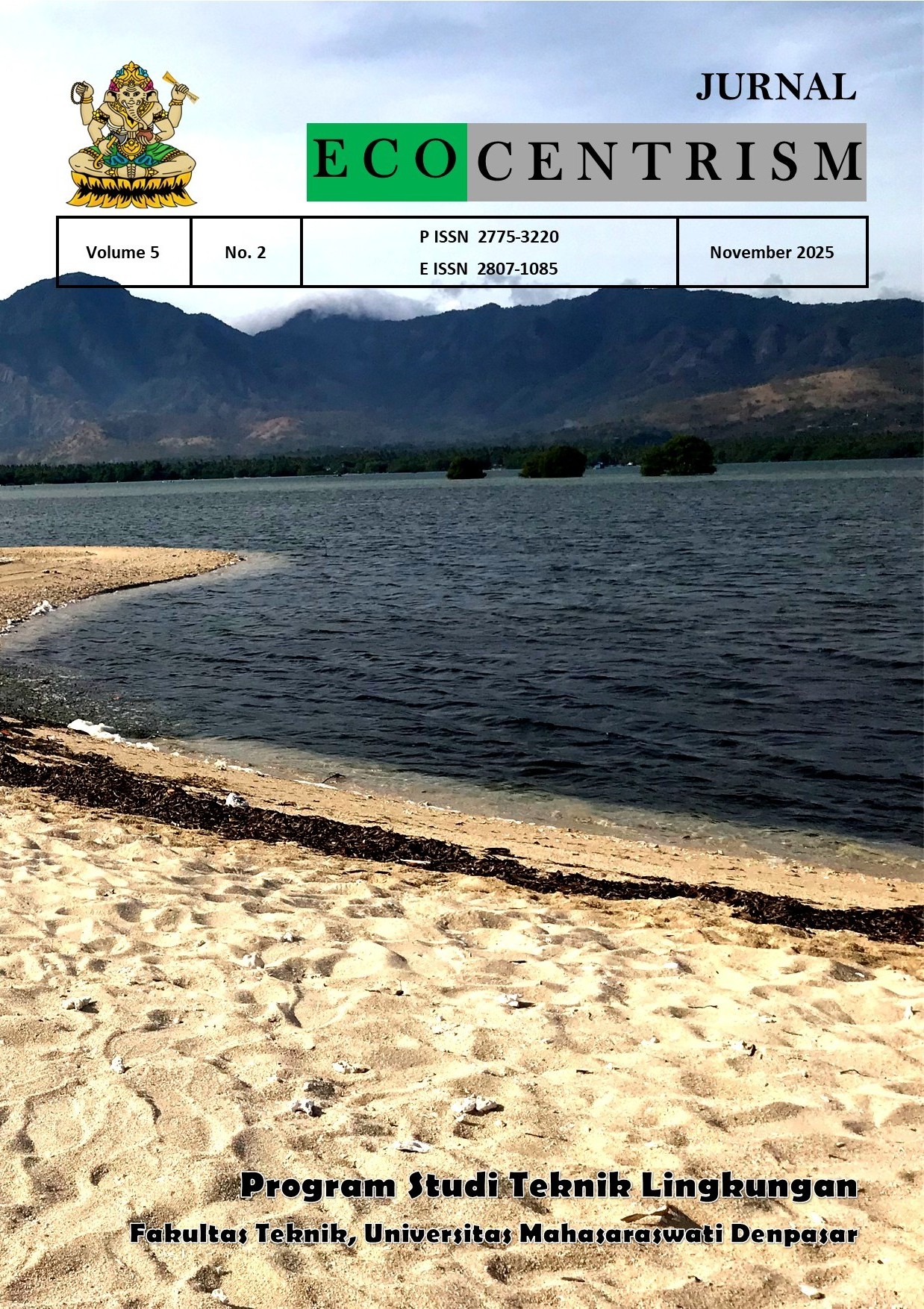EVALUASI STATUS MUTU AIR SUNGAI TUKAD OOS KABUPATEN GIANYAR
DOI:
https://doi.org/10.36733/jeco.v5i2.12842Keywords:
Water Quality, Pollution Index, Tukad Oos, Gianyar, AntrophogenicAbstract
This study was conducted to evaluate the water quality status of the Tukad Oos River in Gianyar Regency based on physical, chemical, and biological parameters, namely temperature, pH, DO, BOD, COD, phosphate, nitrate, and coliform. The research was motivated by increasing anthropogenic activities, such as domestic waste disposal, which potentially degrade river water quality. Sampling was carried out at six points representing the upstream, middle, and downstream segments during two observation periods using the grab sampling method. Laboratory analyses were conducted with reference to the Standard Methods for the Examination of Water and Wastewater, while the water quality status was assessed using the Pollution Index (PI) method based on Class II water quality standards according to Government Regulation No. 22 of 2021. The results showed that temperature 24–30°C, TSS <2–8 mg/L, pH 6.5–8, BOD 2.0–2.7 mg/L, and COD 12–24 mg/L were still below the allowable thresholds, and the PI values ranged from 0.623 to 0.770, indicating that all river segments were categorized as “good” or “unpolluted.” However, there was a tendency for increased temperature, COD, and coliform levels in the downstream segment due to domestic and agricultural activities. This indicates the need for future anticipation efforts through routine monitoring and integrated watershed management to prevent further degradation.
References
Anton, Ihwan, Syahrir, M., Yunarty, Renitasari, D. P., & Kurniaji, A. (2024). Water quality assessment and pollution status analysis in Toro Rivers, Bone Regency. IOP Conference Series: Earth and Environmental Science, 1410(1). https://doi.org/10.1088/1755-1315/1410/1/012021
Citra Wati, T. (2022). Evaluasi Status Mutu Air Sungai Lamandau Dengan Metode Indeks Pencemaran Di Kabupaten Lamandau Provinsi Kalimantan Tengah. Jurnal Teknik SILITEK, 02(01).
Dhiman, V. (2016). A Review the Role of Phosphorus in the Eutrophication of Receiving Waters. International Journal of Research.
Gargitha, G. W. S., Restu, W., Hermawati, A., & Sari, W. (2016). Analisis Kondisi Indeks Kualitas Air pada Enam Mata Air di Kabupaten Gianyar, Bali. ECOTROPHIC, 10(2), 116-122. https://doi.org/10.24843/EJES.2016.v10.i02.p06
Fanela, M. A. P., Takarina, N. D., & Supriatna. (2019). Distribution of total suspended solids (TSS) and chlorophyll-a in Kendari Bay, Southeast Sulawesi. Journal of Physics: Conference Series, 1217(1), Article 12150. https://doi.org/10.1088/1742-6596/1217/1/012150
Harjoyudanto, Y., Hendrizal, A., Darfia, N. E., & Budijono. (2023). Monitoring of Ecotoxicological Parameters in the Floating Net Cage Area in Buluhcina Village, Kampar District, Riau Province, Indonesia. BIO Web of Conferences, 74. https://doi.org/10.1051/bioconf/20237405002
Hashim, A. R., Kamaruddin, S. A., Abd.Aziz, K. N., Tajam, J., Buyong, F., Abdullah, A. L., Azis, T. M. F., & Anscelly, A. (2022). Assessment of the current spatial-temporal variations of ph on the surface waters of kuala perlis, perlis. Journal of Tourism, Hospitality and Environment Management, 7(28), 52-65. https://doi.org/10.35631/jthem.728004
Kusumawati, S., & Widyastuti, M. (2023). Water Quality Status of Omang Pond in Gunungsewu Karst Area, Gunungkidul, Indonesia. E3S Web of Conferences, 468(2), 1-7. doi: 10.1051/e3sconf/202346808009
Nugraha, W. D., Sarminingsih, A., & Alfisya, B. (2020). The Study of Self Purification Capacity Based on Biological Oxygen Demand (BOD) and Dissolved Oxygen (DO) Parameters. IOP Conf. Ser.: Earth Environ. Sci. 448(1). doi: 10.1088/1755-1315/448/1/012105
Peraturan Pemerintah Nomor 22 Tahun 2021 tentang Penyelenggaraan Perlindungan dan Pengelolaan Lingkungan Hidup
Puspita, I., Ibrahim, L., & Hartono, D. D. (2016). Pengaruh Perilaku Masyarakat Yang Bermukim Di Kawasan Bantaran Sungai Terhadap Penurunan Kualitas Air Sungai Karang Anyar Kota Tarakan (Influence of The Behavior of Citizens Residing in Riverbanks to The Decrease of Water Quality in The River of Karang Anyar Tarakan City). Journal of People and Environment, 23(2), 249-258. https://doi.org/10.22146/jml.18797
Putri, R. A. N., & Triajie, H. (2021). Tingkat Pencemaran Organik Berdasarkan Konsentrasi Biological Oxygen Demand (BOD), Chemical Oxygen Demand (COD), Dan Total Organic Matter (TOM) Di Sungai Bancaran, Kabupaten Bangkalan. Juvenil: Jurnal Ilmiah Kelautan Dan Perikanan, 2(2), 137–145. https://doi.org/10.21107/juvenil.v2i2.10778
Rares, J. P., Sholichin, M., & Yuliani, E. (2016). Analisis Pengelolaan Kualitas Air Di Perairan Danau Tondano. Tesis. Universitas Brawijaya. Malang.
Rudaru, D. G., Lucaciu, I., & Fulgheci, A. M. (2022). Correlation between BOD5 and COD – biodegradability indicator of wastewater. https://doi.org/10.21698/rjeec.2022.207
Septiani, N. K. A., Wayan Budiarsa Suyasa, I., Nyoman Rai, I., & Studi MagisterIlmu Lingkungan, P. (2022). Analisis Kualitas Air Dan Strategi Pengendalian Pencemaran Di Danau Batur Menggunakan Analisis Force Field PERUMDA Air Minum Tirta Sanjiwani Kabupaten Gianyar 2). ECOTROPHIC, 16(1), 10–19.
Soeprobowati, T. R., Suhry, H. C., Saraswati, T. R., & Jumari, J. (2020). Kualitas Air dan Indeks Pencemaran Danau Galela. Jurnal Ilmu Lingkungan, 18(2), 236–241. https://doi.org/10.14710/jil.18.2.236-241
Supriyanto, & Koestoer, R. H. (2022). Selected Measurement Parameters of Water Quality: Comparative Insight of India and Indonesia. Journal of Geography Science and Education, 4(1), 32-44. https://doi.org/10.32585/jgse.v2i2.xxx
Suyasa, B., Pancadewi, K., Suprihatin, I. E., Dwi, A., & Suastuti, G. A. (2018). Kualitas Air Sungai Di Kawasan Wisata Pantai Petitenget, Kerobokan Kabupaten Badung Bali. ECOTROPHIC, 12(2), 225-238. https://doi.org/10.24843/EJES.2018.v12.i02.p11
Syafrudin, Sarminingsih, A., Juliani, H., Arief Budihardjo, M., Sila Puspita, A., Ya, I., & Nabila, azzan. (2023). Water Quality Measurements with TSS, TDS, Total Phosphate, Nitrate, Total Coliform Parameters in the Garang Water Shed. Jurnal Presipitasi, 20(3), 776-790.


